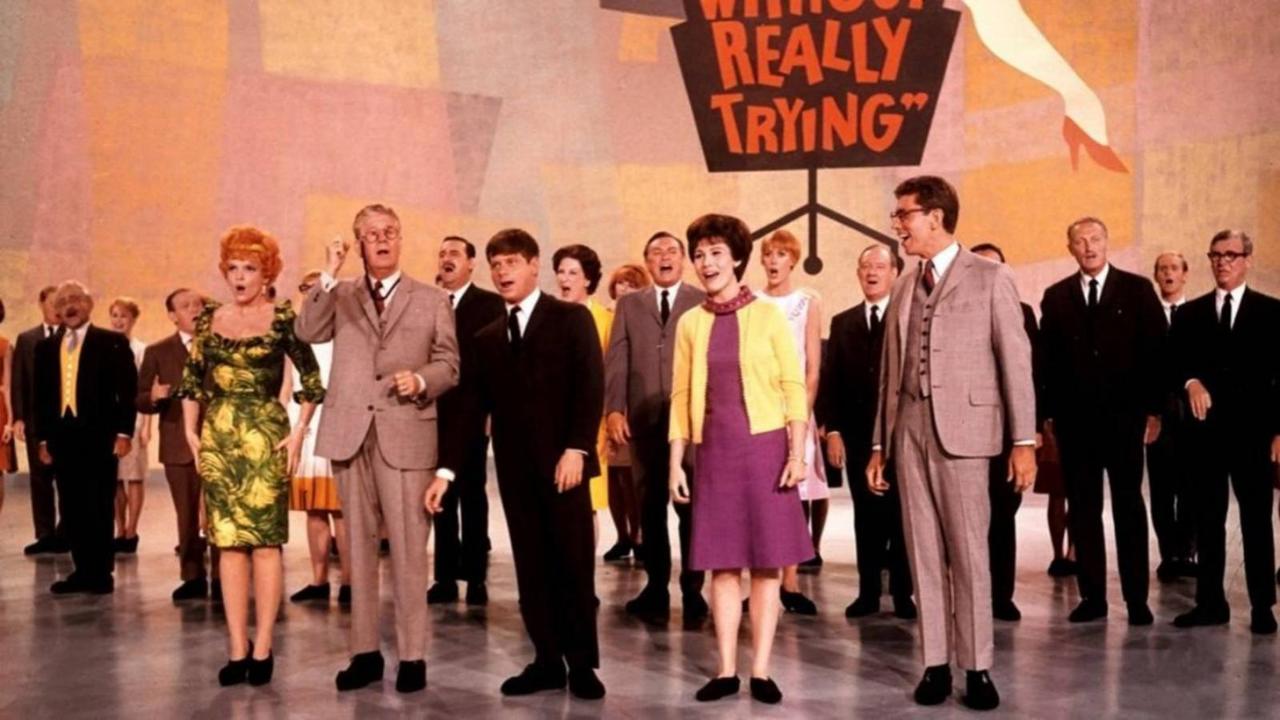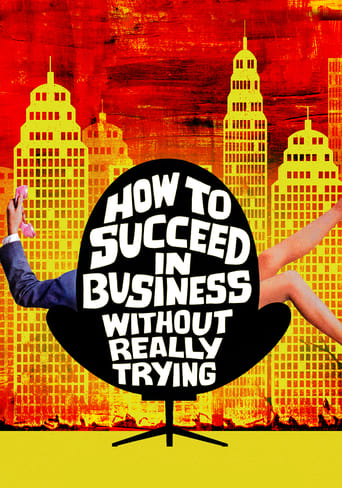

Definitely a product of the 1960's, this film version of one of the longest running shows of that decade hasn't done bad for one that seemed to be almost forgotten until the release of the video in the early 1990's and the two subsequent Broadway revivals. The movie isn't totally faithful to the original show, and several of the show's best songs are cut out to be heard simply over the action. But to cast the show's original star, Robert Morse, repeating his role as J. Pierpont Finch, was a testament to how the producers really made an effort to transfer the show to screen with dignity. Certainly, Morse had gone onto a fairly successful film career, and even if he's a bit older than when he created the role, his boyish charm is certainly present.Finch is a window washer who reads the title book and longs to make it as an employee of World Wide Wickets (whatever wickets are.....) and hired to work in the mail room, he soon schemes his way out of there, gaining the attention of practically everybody in the company, including the romantic aspirations of secretary Michelle Lee. With that gorgeous smile and winning personality, Lee (who took over the role of Rosemary in the original Broadway production), is excellent, and those who only know her as Karen from "Knot's Landing" will find her totally down to earth personality refreshing. Rudy Vallee adds charm to his otherwise pompous character of J.P. Bigley, the big boss, and Ruth Kobart brings an earthiness to the otherwise hardboiled executive secretary. When she breaks out in her beautiful singing voice in the 11:00 number, "Brotherhood of Man", she may have you cheering! Anthony Teague is appropriately smarmy as the company snitch, and Kay Reynolds adds "the perfect pal" quality to Rosemary's friend, Smitty, especially playing matchmaker in the delightful "Been a Long Day" where three characters express their thoughts out loud in song as they prepare to leave for the day and find a way to get Finch and Rosemary together for their first date. Busty Maureen Arthur adds a Lorelei Lee like sensibility to her otherwise dumb sexpot Hedy LaRue. Individual performances playing the various secretaries and executives are too many to mention, but everybody contributes. Frank Loesser's score is brilliantly rousing, a fine successor to his most remembered Broadway show, "Guys and Dolls", and includes one of the finest songs about self-confidence ("I Believe in You") which actually reveals the lead character's hidden insecurities.Of the songs cut from the show, "Paris Original" is perhaps the most missed, but it really didn't move the plot along, so I can understand why it ended up being cut. In a movie era where most movie musicals were epics or lavish spectacles, "How to Succeed" is a simple delight, filled with many fun moments, and is certainly worthy of repeat viewings.
... View MorePlot: The ultimate self-help book success story, with a little song and dance tossed in. Drive-in Rating: Yield right of way. Odd musical but one that's clearly got legs since it's enjoyed Broadway revivals. My first choice for movie remake lead is Jonah Hill as J. Pierpont Finch, the scruffy, slightly dopey, enjoyably conniving, and unconventional lead played in the movie by Robert Morse. Costumes and set decoration are ultra 60's for those who are retro fans. The movie was best when you could chart Morse's ladder-climbing by the hour or day, but toward the end you lose sight of the timer and it becomes a little less amusing. Still a worthy commentary on modern-day business.
... View MoreToday, at 77 years old, Robert Morse is still going strong as Mad Men's Cooper, but there's no question that his heyday was the late '50s to the early '70s, when his toothy grin, amiable tenor and boyish acting made him the toast of Broadway. Here, he repeats his Broadway success as J. Pierpont Finch in "How to Succeed In Business Without Really Trying," a 1967 film also starring Michele Lee, Rudy Vallee, and Anthony Teague. Lee and Vallee also repeat their Broadway roles.With music and lyrics by Frank Loesser and book by Abe Burrows, "How to Succeed" is the story of window washer J. Pierpont Finch, who in a matter of days, thanks to a book he carries around by the same name as the film title, has risen through the ranks of the Worldwide Wicket Company without doing any work. He has his enemies, but one very good friend in Rosemary (Lee), a secretary with a crush on him who wants Ponty, as he is called, to make good.I'm not all that familiar with the musical, but I understand that there are several songs missing, including "Happy to Keep His Dinner Warm." The standouts are "I Believe in You," which became a hit song, and the rousing "Brotherhood of Man." What makes the music for me is the wonderful orchestrations.Sexist today in some of its themes, this is a brightly-colored musical, done the old-fashioned way, without cutting the numbers to pieces. Morse is delightful and never had any trouble adapting to film. Ditto a young, pretty Lee who sings "I Believe in You" like a dream. Vallee is well cast as the head of the company who has a girlfriend on the side. Anthony Teague is very good as the boss' nephew, but Charles Nelson Reilly played this role on stage, and I can only imagine how hilarious he was in the role.Good movie, and director David Swift keeps the pace moving.
... View MoreI can't say I enjoyed this movie. I fast-forwarded through all of the songs as I found them dull, uninspired, and repetitive. Not Loesser's best, and no way near as good as those in Guys and Dolls. I found Robert Morse interesting to watch, although I kept hoping right up to the end that he would somehow get his comeuppance and be knocked back down to window washer! Although his tricks were fascinating, he was rather obnoxious and unpleasant in how he used people and didn't care who he crushed on his way to the top (yes, I know it is satire, but he still was irritating!).I did find that things picked up near the end, but the ending itself didn't make sense to me. Why was it suddenly forgotten that Ponty had caused 6 offices to be wrecked and the company to lose money? Why did Michelle Lee suddenly forget that she was disgusted with Ponty for stealing Bud's idea and become his fiancée again? The art direction and colours were fabulous though, and I really enjoyed the sets and those enormous offices!
... View More